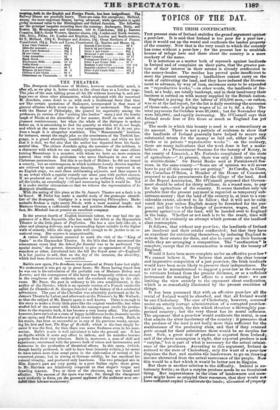Malfe's new opera, The Bondman, was produced at Drury Lane
last night. We understand it was got up in great haste; Mr. Bunn having found that he was out in his calculation of the probable run of Madame Bishop and Loretta; and the consequence of this hurry was frequently evident enough in the roughness of the orchestra and the confused singing in the cho- ruses. Mr. Bunn, the poet in ordinary to his own establishment, is the author of the libretto; which is an operatic version of a French vaudeville called Le Chevalier de St. Georges, founded on the history of that celebrated adVenturer. The part of the Chevalier was admirably performed at the St. James's Theatre by Lafont,and afterwards at the Princess's by Mr. Wallack ; so that the subject of Mr. Bunn's opera is well known. There is enough in the story to make a lively little piece like the original vaudeville; but when stuffed full of the matter with which the manager-poet swells his produc- tions to the requisite bulk, it has become a very heavy affair. The public, however, have arrived at a state of happy indifference to the dramatic merits of an opera; and The Bondman is at all events better than Loretta. Balfe, in his music, has been as successful as in any of his previous works, except- ing his first and best, The Siege of Rochelk; which is the best simply be- cause it was the first, for then there was some freshness even in his man- nerism. Balfe's music is well calculated to take the general ear. It has no depths which it costs any effort to fathom, and its melodies become popular from their very triteness. Balfe is, moreover, a man of skill and experience; conversant with the powers both of voices and instruments, and dexterous in the production of theatrical effects. In this opera, (which, though hastily produced, is said to have been leisurely written,) he seems to have taken more than usual pains in the elaboration of several of his concerted pieces; but in aiming at German solidity, he has sacrificed his natural vivacity, and produced only heaviness. The two principal airs in Miss Romer's part are very pretty, in a pure Italian style: those given to Mr. Harrison are felicitously congenial to that singer's vulgar and drawling manner. Two or three of the choruses, too, are broad and effective. The success of the opera was real; for, though the clacqueurs were evidently in force, yet the general applause of the audience soon ten- deted'th'eir labours tmnecessary.


























 Previous page
Previous page